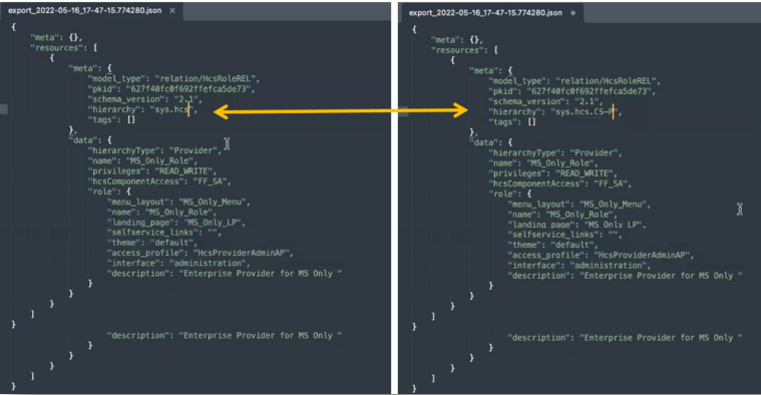Add and Edit Roles#
Overview#
Provider administrators can manage the roles that are available for administrators, operators, and users at lower levels in the hierarchy.
Edit a Role#
To edit an existing role:
Log in as provider administrator.
Go to Role Management > Roles.
Locate the role you want to change; then, click on the role to open it.
Update the role settings, as required.
Save your changes.
Note
If hierarchy node types are removed from the Hierarchies Allowed list while users or Site Defaults reference this node type, then the update cannot be saved. The transaction Message shows:
“Cannot update Role. Some User(s) or Site Defaults exist with the hierarchy rules defined in this role.”
Add a Role#
To add a new role:
Log in as provider administrator.
Choose Role Management > Roles.
Click Add.
Define role settings:
Setting |
Description |
|---|---|
Name* |
Name of the role. This field is mandatory. |
Hcs Component Access* |
Determines the type of HCS components a user with this role is permitted to access. Options are:
|
Service Assurance Role Type * |
Mandatory. The type of operation a user with this role can perform, either Administrator or Operator. |
Hierarchy Type* |
Hierarchy level at which this role is created and and can be assigned. For example, at Provider level, the following values are allowed: Provider, Reseller, Customer, and Site. While at the Reseller level, the following values are allowed: Reseller, Customer, Site. |
Hierarchies Allowed |
Hierarchies where this role can be assigned to a user. Where a user is at a specific hierarchy, available roles will then include all roles that include that specific hierarchy in the Hierarchies Allowed list. Refer to the Hierarchies Allowed List Impact below. When the role is saved, the selected Hierarchy Type is added to the Hierarchies Allowed list if it is not included. If the Hcs Component Access field has Fulfillment and ServiceAssurance selected, at least one entry must be available here. |
Description |
Description of the role. |
Access Profile* |
Permissions for resources are defined in Access Profiles. This field is mandatory. |
Menu Layout |
The menu layout assigned to the role. Controls the menu options available to users assigned to the role. |
Dashboard |
The home page assigned with the role. Controls what the home page looks like for users assigned to the role. |
Theme* |
The name of the theme assigned to the role. The theme controls the overall look and feel of the Admin Portal. This field is mandatory. |
Self Service Feature Display Policy |
The selected Self Service Feature Display Policy that is associated to the role. |
Self Service Links |
Provide useful links to Self Service end users. |
Click Save to save the role.
Hierarchies Allowed List Impact
The following areas in the system are impacted by list entries available in the Hierarchies Allowed List of a role:
Microsoft-only Role#
Starting with version 21.3-PB1, VOSS Automate ships with a Microsoft-only role (MicrosoftOnlyRole) and
accompanying role-based
access control elements, which are predefined for a Microsoft-only user interface experience.
These elements include
predefined field display policies, dashboards (MicrosoftOnlyDashboard), and menus (MicrosoftOnlyMenu). Installing
these templates provides the baseline for a Microsoft-only version of VOSS Automate, and hides
non-Microsoft GUI elements, such as the FDPs, menus, and dashboards
reflecting functionality used for managing Cisco devices.
To use the MicrosoftOnlyRole in VOSS Automate:
Log in to VOSS Automate as hscadmin.
Go to (default menus) Role Management > Roles.
Locate MicrosoftOnlyRole in the list view.
Select the role in the list (or click on the role to open it).
Note
This role ships with a standard access profile and a predefined menu layout and dashboard.
Click Export to export the role to a JSON file, and save the file to your local computer.
Edit the JSON file to specify the hierarchy where you want to use the role.

Go to (default menus) Administration Tools > Import.
Browse to the location you saved the JSON file, then click Import.
Go to (default menus) Role Management > Roles to verify that the role now exists also at the hierarchy you specified.
At the hierarchy where you wish to assign the role to a user (Provider or Customer), go to (default menus) User Management > Admins. Choose a user (or add a user), then on the User Details tab, from the Role field, choose the role (
MicrosoftOnlyRole) you imported to this level, and save your change.
